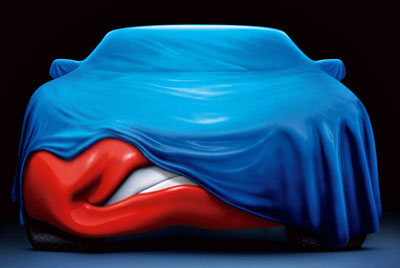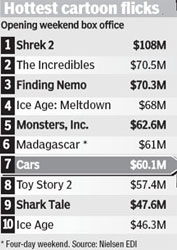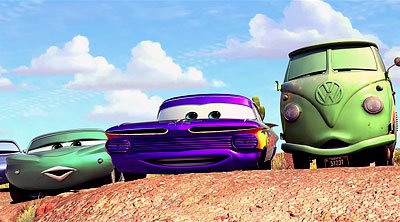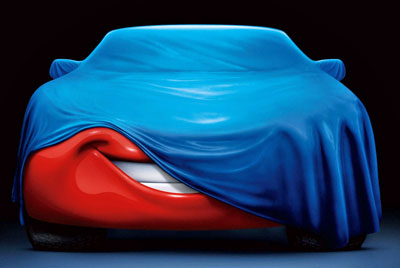
From Ronald Grover atbusinessweek.com (edited)
When is a blockbuster film a disappointment? Only on Wall Street, which seems to have moved this weekend's opening of the Walt Disney-Pixar film Cars off the side of the road into a ditch marked for losers. Merrill Lynch analyst Jessica Reif Cohen, one of Wall Street's smartest, called Cars's $62.8 million weekend take a "disappointing performance." Bank of America analyst Douglas Shapiro points out it "has a couple of negative implications" for Disney shares, and says it "could struggle to gross $230 million domestically."
Excuse me. It will "struggle" to cross $230 million in the U.S.? If it, in fact, wobbles it's way to $230 million this year that would have ranked as last year's fourth-largest film, about 10% or so behind Warner Bros.' Harry Potter & the Goblet of Fire. (I don't recall anyone calling that a disappointment, despite its $140 million budget, about double Car's budget, according to movie site imdb.com.) As for Car's "disappointing" opening weekend, only three films this year - X Men: The Last Stand, The Da Vinci Code, and Ice Age: The Meltdown; have opened better. Simply put, how is this disappointing?
 Of course, it is disappointing because Wall Street analysts had projected that Disney's $7.4 billion acquisition this year of Pixar would turn it once more into a world-beating animation superpower. Reif, for instance, had estimated that Cars would gross $270 million. BofA's Shapiro noted that Pixar's prior four releases (including such huge hits as Finding Nemo) had averaged $275 million—and the difference between a $275 million film and a $225 million film is 0.4 cents per share in Disney's earnings.
Of course, it is disappointing because Wall Street analysts had projected that Disney's $7.4 billion acquisition this year of Pixar would turn it once more into a world-beating animation superpower. Reif, for instance, had estimated that Cars would gross $270 million. BofA's Shapiro noted that Pixar's prior four releases (including such huge hits as Finding Nemo) had averaged $275 million—and the difference between a $275 million film and a $225 million film is 0.4 cents per share in Disney's earnings.Let's look at what Disney gets for its $7.4 billion acquisition. For starters, it gets the animation brain power it so sorely lacked. We're talking here not only Pixar's top creative guru John Lasseter, perhaps the most creative mind in animation today, but Pixar superstars like The Incredibles director Brad Bird. He's hard at work now on an upcoming Pixar flick called Ratatouille, which is scheduled for release next summer.
Lasseter, meanwhile, was named Disney's top creative executive after the deal, giving him the ability to oversee Disney's theme park and other businesses. The added value there is incalculable.

On top of that Disney, which last year faced the prospect of Pixar walking away after their joint 13-year relationship, doesn't have to worry about Jobs, Lasseter and company making their films for one of Disney's competitors. Moreover, the two sides are no longer openly battling over whether to make sequels for some of Pixar's prior blockbusters. Disney Disney wanted to make them; Pixar resisted. Now, Disney has the use of Pixar's brain trust to make sequels to Pixar movies, movies that are sold only on DVDs and TV shows based on Pixar products.
In May, Iger told analysts that production was starting for Toy Story 3, which Eisner had pushed to make over Pixar CEO Steve Jobs' objections. Now the two sides are apparently happy as clams.

Anyone who knows Disney knows that the Pixar deal was about more than a single movie. Pixar was meant to restore the lost luster of Disney creativity, and it doesn't take a rocket scientist to see that the $62.8 million Cars opening was just a tad better than the $40 million opening weekend for Chicken Little, Disney's last big non-Pixar animated flick.
On top of that, Disney's machinery turns any strong piece of "content" into a veritable money stream, with games, records, TV shows, and theme park rides. So give Disney a break, and its Pixar deal a chance, investors. Short-sellers may be chortling now. But I'm betting that Disney gets the last laugh, and they won't be all coming from the next Pixar blockbuster.
------------

No comments:
Post a Comment